Positive Affirmations for Kids and Parents (English / Chinese Printable)
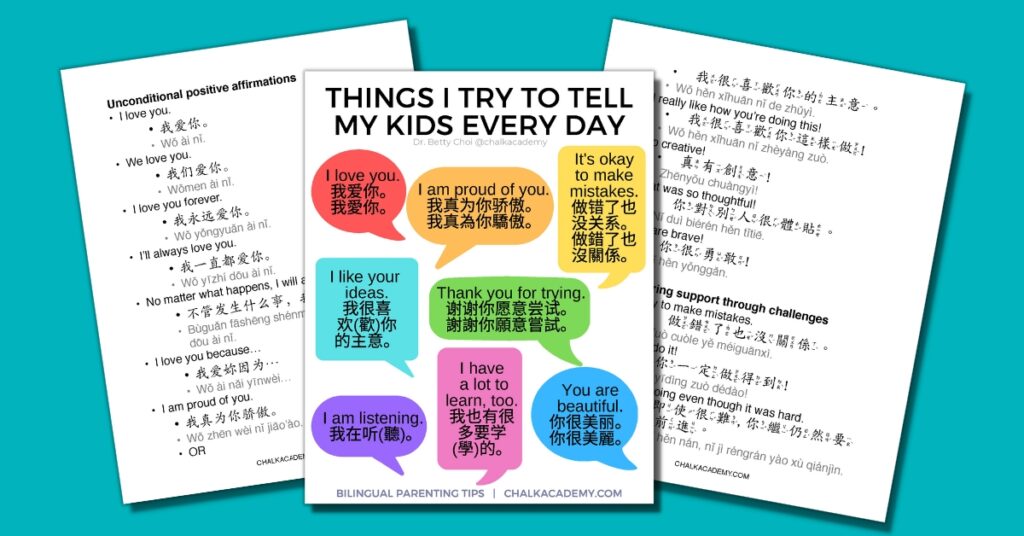
Like most Asian Americans, I never heard positive affirmations in English or Mandarin Chinese during my childhood. So when I began to re-learn Chinese with my kids, saying phrases like 我爱你 / 我愛你 (“I love you” in Mandarin) felt awkward.
Although words of love and encouragement are common in American culture, care and concern are often expressed non-verbally among Asian immigrants.
Before my husband and I had kids, we often discussed what we would do differently as parents. Since we rarely heard “I love you” from our Asian parents, we promised to say it often to each other and our future children. We understood the psychology of positive affirmations for kids and what we were missing from childhood.
Despite cultural differences, language is living and evolving. Together, we can normalize positive affirmations for children in English and Chinese.
Parenting differences in Western versus Asian culture
Compared to Asian culture, Westerners (eg, Americans) tend to be affectionate physically and verbally. However, when “I love you” is used as liberally as “I love ice cream,” the words can feel superficial and lose meaning.
On the other hand, emotions are often subdued in Asian cultures. Love is typically shown through acts of service, such as ensuring the people we care about are fed and clothed, often through self-sacrifice.
The downside for many Asian Americans is that love can feel conditional. Love and worthiness may depend on a parent’s standard of perfection, success, and filial duty.
Related: Emotions Activities and Printables (Chinese, Korean, English)
The case for using positive affirmations in Chinese and English
Due to my fascination with these cultural differences, I studied psychology in college. My immigrant parents were disappointed with the tuition and time spent on these classes.
However, research shows positive affirmations can improve health, well-being, and relationships. Self-confidence can also help a child persevere through bullying and other stressful experiences.
Related: Bullying Prevention Resources for Multilingual and Multicultural Kids
Psychologist Jenny Wang points out: “There is something powerful about words. And when they are not spoken, it can feel like a void that may never be filled. There is also something powerful about the words ‘I love you’ spoken freely, not in exchange for any behavior or transaction.”
Therapist Sam Louie says: “Many Asian children (now adults in my practice) report thinking their parents loved them (cognitive understanding) yet in their hearts can not “feel” the love and hence an emotional disconnect resounds in their souls. To feel loved and have healthy attachments with their parents or caregivers, children need [to be] seen, soothed, safe, and secure.”
How to practice positive affirmations for kids – and for ourselves
Where do we begin with our kids if we’re not used to hearing positive affirmations in English, Chinese, or any language?
Keep in mind that the first step is the hardest: 万事开头难 / 萬事開頭難。 (Wàn shì kāi tóu nán.) Just a heads up: you might even feel awkward or corny. And that’s okay! Validate any uncomfortable feelings that you have.
If you are trying to move away from past habits of yelling and scolding, be honest with your child about this process. Apologize, and share that you are trying something new for your family. This can be a powerful growing experience for everyone.
You can choose from plenty of phrases from this article and practice saying one to yourself. Then, say one positive affirmation to your kid when they show you their latest creation, when they ask you a question, or when you tuck them into bed. Find a moment that feels most sincere and genuine.
You can also leave a sticky note or print positive affirmation messages for your child. Follow up with a hug (with consent) to get that boost of endorphins from a safe and comforting touch.
30 Positive affirmations that parents can say to kids in Chinese and English
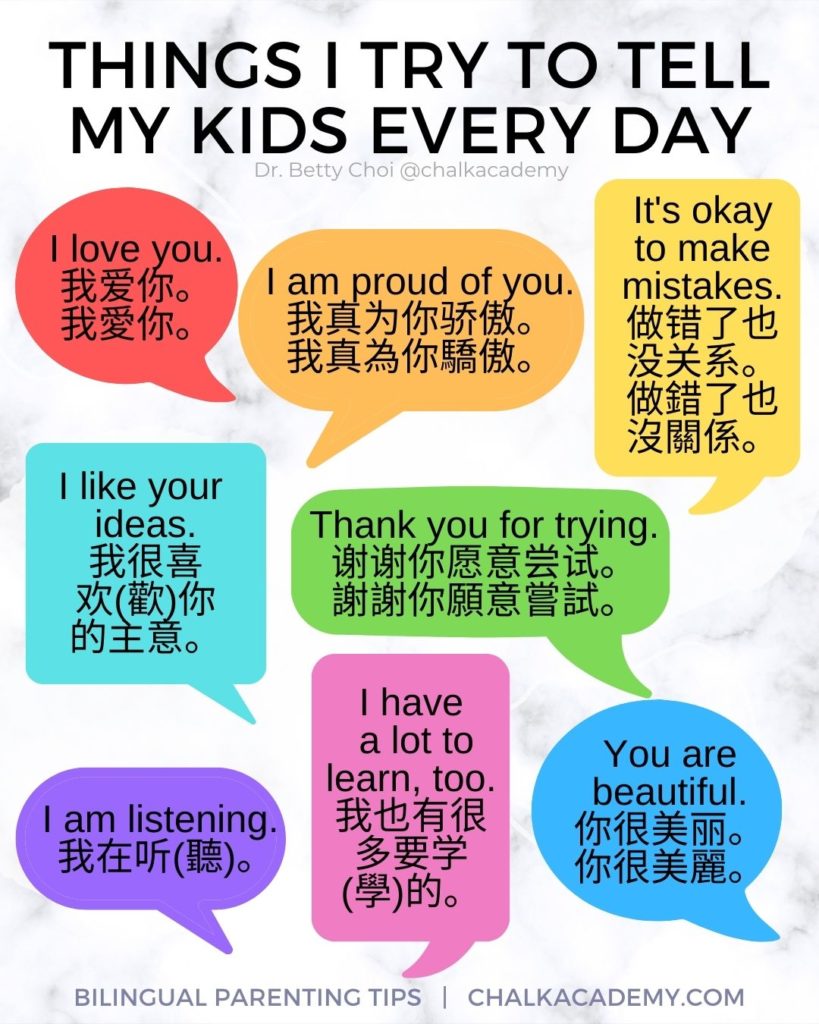
I’ve compiled a list of positive affirmations in English and Chinese that children and parents can learn together.
Starting with a few sentences is a great way to get used to the practice. Then, you can implement more as they become part of your routine.
With the help of our Chinese tutor and relatives, I’ve translated the phrases into simplified Chinese, traditional Chinese, and Hanyu Pinyin for parents who are learning with their children.
Your child can also learn alongside you by repeating some of the phrases.
Please note that phrases vary in regions like mainland China, Hong Kong, Taiwan, Singapore, Malaysia, etc.
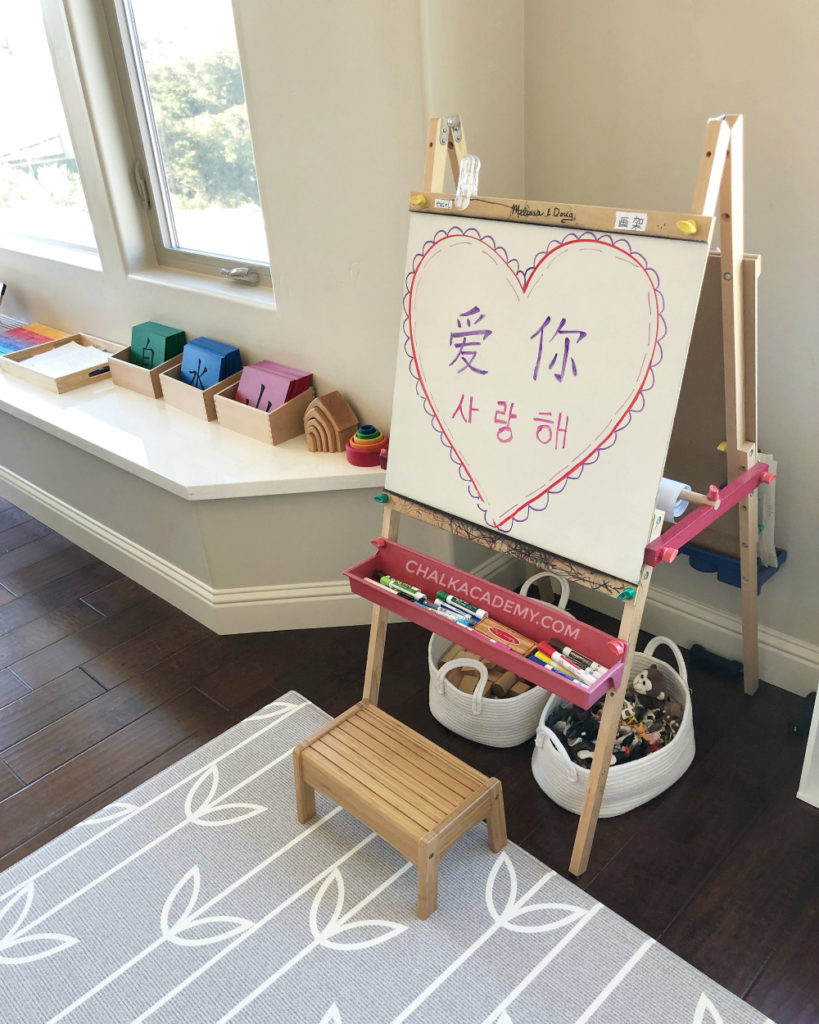
Unconditional positive affirmations
Since few people look like our children in our community, we want to ensure they know they are worthy and valued. These English and Chinese affirmations can help establish a positive relationship between you and your child. In turn, this can tremendously impact your child’s self-worth.
- I love you. 我爱你。/ 我愛你。(Wǒ ài nǐ.)
- We love you. 我们爱你。/ 我們愛你。(Wǒmen ài nǐ.)
- I love you forever. 我永远爱你。(Wǒ yǒngyuǎn ài nǐ.)
- I’ll always love you. 我一直都爱你. / 我一直都愛你. (Wǒ yīzhí dōu ài nǐ.)
- No matter what happens, I will always love you. 不管发生什么事,我永远都爱你。 / 不管發生什麼事,我永遠都愛你。(Bùguǎn fāshēng shénme shì, wǒ yǒngyuǎn dōu ài nǐ.)
- I love you because… 我爱妳因为 / 我愛妳因為….(Wǒ ài nǎi yīnwèi.)
- I love you so much it hurts. 好疼你喔。(Hǎo téng nǐ ō.) – This unique phrase is said affectionately by parents to children but not other relatives or friends.
- I am proud of you. 我以你为荣!/ 我以你為榮!(Wǒ yǐ nǐ wéi róng!) OR 我真为你骄傲。/ 我真為你驕傲。(Wǒ zhēn wèi nǐ jiāo’ào.)
- You are beautiful on the inside and outside. 你的外表和内在都一样美丽。/ 你的外表和內在都一樣美麗。(Nǐ de wàibiǎo hé nèizài dōu yīyàng měilì.)
- You are kind-hearted. 你很善良。/ 你很善良。(Nǐ hěn shànliáng.)
- You are capable. 你很能干。 / 你很能幹。(Nǐ hěn nénggàn.)
- You are special. 你很特别。/ 你很特別。(Nǐ hěn tèbié.)
Respect for the child
Body language is important for showing that you give your child undivided attention. This includes eye contact and crouching down to the child’s eye level.
In addition, the following English and Chinese phrases show care for a child’s thoughts and actions.
- Thank you for telling me.
- 谢谢你告诉我。/ 謝謝你告訴我。(Xièxiè nǐ gàosù wǒ.)
- 谢谢你跟我说。/ 謝謝你跟我說。(Xièxiè nǐ gēn wǒ shuō.)
- I am listening. 我在听。我在聽。(Wǒ zài tīng.)
- I get it, I understand how you feel. 我很能明白, 我理解你的感受。(Wǒ hěn néng míngbái, wǒ lǐjiě nǐ de gǎnshòu.)
- I like your ideas. 我很喜欢你的主意。/ 我很喜歡你的主意。(Wǒ hěn xǐhuān nǐ de zhǔyì.)
- I really like how you’re doing this! 我很喜欢你这样做! / 我很喜歡你這樣做! (Wǒ hěn xǐhuān nǐ zhèyàng zuò)。
- So creative! 真有创意 / 真有創意! (Zhēnyǒu chuàngyì!)
- That was so thoughtful! 你对别人很体贴。(Nǐ duì biérén hěn tǐtiē.) OR You’re so thoughtful. 你很贴心。/ 你很貼心。Nǐ hěn tiēxīn.
- You are brave! 你很勇敢! (Nǐ hěn yǒnggǎn)
Try this: 7 Natural Ways to Improve Communication Through Play
Encouraging effort
Instead of a generic “Good job! 做得好! (Zuò dé hǎo)” or “Awesome 太棒了! (Tài bàngle),” specific feedback helps children understand what exactly they did that was positive. It goes deeper and will resonate more with their efforts.
Furthermore, praising the process rather than the result is often more effective for encouraging effort and hard work. Here are positive effort-oriented affirmations in Chinese and English.
- You worked very hard! 你很努力!(Nǐ hěn nǔlì!)
- _______ is an awesome idea! _________是个很棒的主意 / 是個很棒的主意! (shìgè hěn bàng de zhǔyì)
- You have great ideas. 你的想法很棒。(Nǐ de xiǎngfǎ hěn bàng.)
- You were so focused! 你很專心。(Nǐ hěn zhuānxīn!)
- You were conscientious about this! 你這麼認真地做這件事!(Nǐ zhème rènzhēn dì zuò zhè jiàn shì!)
- Your observations were very detailed. 你的观察非常细致 / 你的觀察非常細緻。(Nǐ de guānchá fēicháng xìzhì.)
- Great decision. 好的决定 (Hǎo de juédìng) or 好的选择/好的選擇. (Hǎo de xuǎnzé)
- Thank you for trying. 努力就好。(Nǔlì jiù hǎo) OR 谢谢你愿意尝试。/ 謝謝你願意嘗試。(Xièxiè nǐ yuànyì chángshì.)
- You made most of it by yourself! 大部分是你自己製作的! (Dà bùfèn shì ní zìjǐ zhìzuò de!)
- You were independent. 你是独立的。/ 你是獨立的。(Nǐ shì dúlì de.)
Try this: Effective Ways to Praise Kids Instead of “Good Job” (Chinese and English)
Unwavering support through challenges
Growing up, I knew I was disappointing my parents with each mistake I made and every milestone I missed. A+ was the standard expectation. As such, I constantly felt my efforts were never enough.
On the other hand, my husband and I want our children to know that our love is unconditional. The following English and Chinese positive affirmations show our support through struggles.
- It’s okay to make mistakes. 做错了也没关系。/ 做錯了也沒關係。(Zuò cuòle yě méiguānxì.)
- You can do it! 你一定做得到! (Nǐ yīdìng zuò dédào!)
- You kept going even though it was hard. 即使很难, 你继仍然要续前进。/ 即使很難, 你繼仍然要續前進。(Jíshǐ hěn nán, nǐ jì réngrán yào xù qiánjìn.)
- Though it was hard, you were very patient. 虽然很难,但你很有耐心 (Suīrán hěn nán, dàn nǐ hěn yǒu nàixīn)
- I enjoy doing this with you. 我真的很喜欢和你一起做这件事。/ 我真的很喜歡和你一起做這件事。(Wǒ zhēn de hěn xǐhuān hé nǐ yīqǐ zuò zhè jiàn shì.)
- Add oil! 加油! (Jiāyóu!)
Although 加油! translates to “add oil,” it is probably the most authentic Chinese form of encouragement in this list. In English, 加油 can mean any of the following:
- “Hang in there!”
- “Keep trying!”
- “Let’s do this!”
- “Go! Go! Go!”
- “Good luck!”
- “I’m rooting for you!”
In addition, 加油! can also be used in the context of disappointment. For example, if someone fails a test, a parent or teacher might say, “你应该加油 / 你應該加油 (Nǐ yīnggāi jiāyóu). This can mean “you need to try harder” or “you need to put in more effort.”
Related: “Grace Said” Focus, Patience, Persistence Chinese Picture Books
Humility and honesty
Being humble in front of your child and welcoming honesty can encourage trust and support through mistakes and challenges.
- Thank you for being honest with me. 谢谢你说实话/謝謝你說實話。(Xièxiè nǐ shuō shíhuà) or 谢谢你如实跟我说 / 謝謝你如實跟我說。(Xièxiè nǐ rúshí gēn wǒ shuō.)
- I have a lot to learn, too. 我也有很多要学的。/ 我也有很多要學的。(Wǒ yě yǒu hěnduō yào xué de.)
And when my kids encourage each other or even me, I let them know that I appreciate it: “Thank you for encouraging me!” 谢谢你鼓励我! / 謝謝你鼓勵我! (Xièxiè nǐ gǔlì wǒ.)
Printable bilingual Chinese positive affirmations and infographic
What other positive affirmations do you say to your kids in English or Chinese?
Positive affirmations are a way of letting our children know that we listen to them, validate their feelings, and are there to support them no matter what they do. They’re simple to say yet have a long-lasting impact on their confidence and security.
Do you feel comfortable saying “I love you” and other positive affirmations to your children in Chinese or other languages?
Please feel free to share your translations and experiences in the comments below.
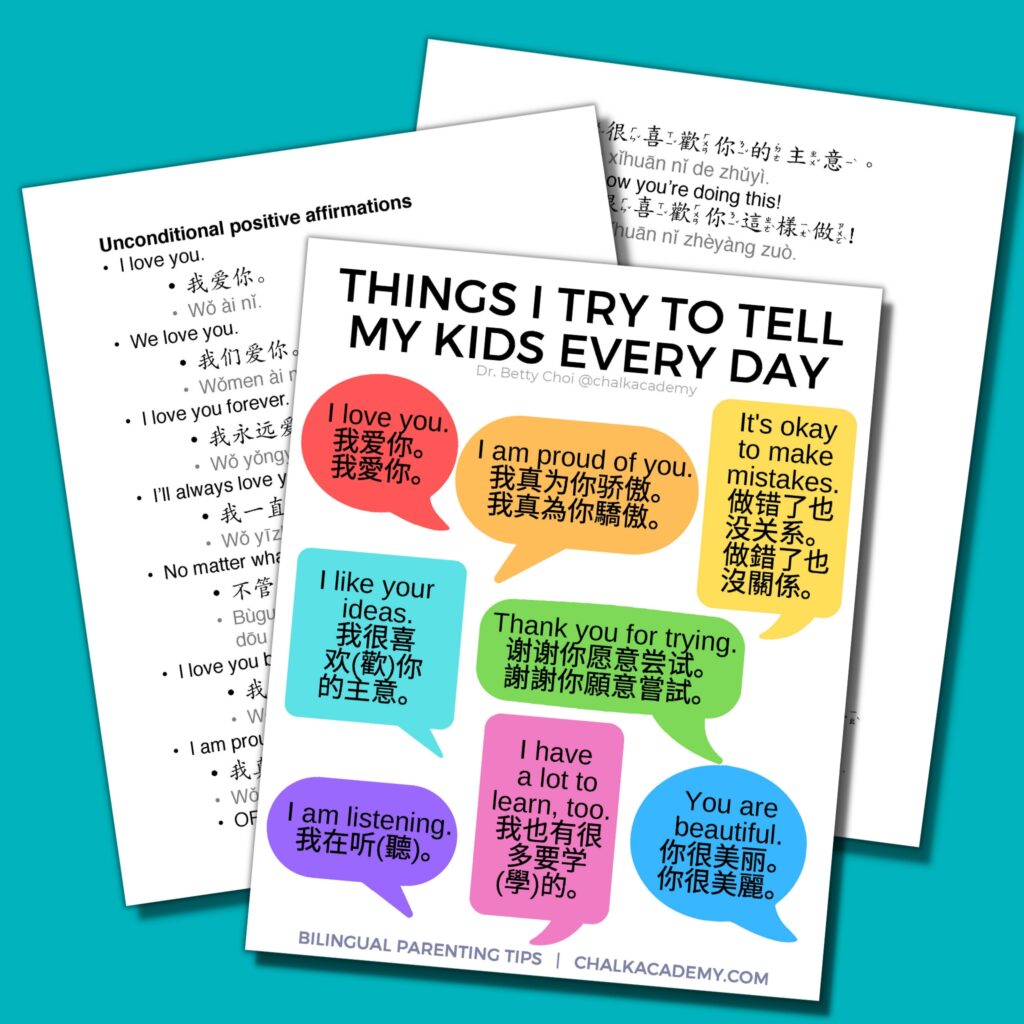
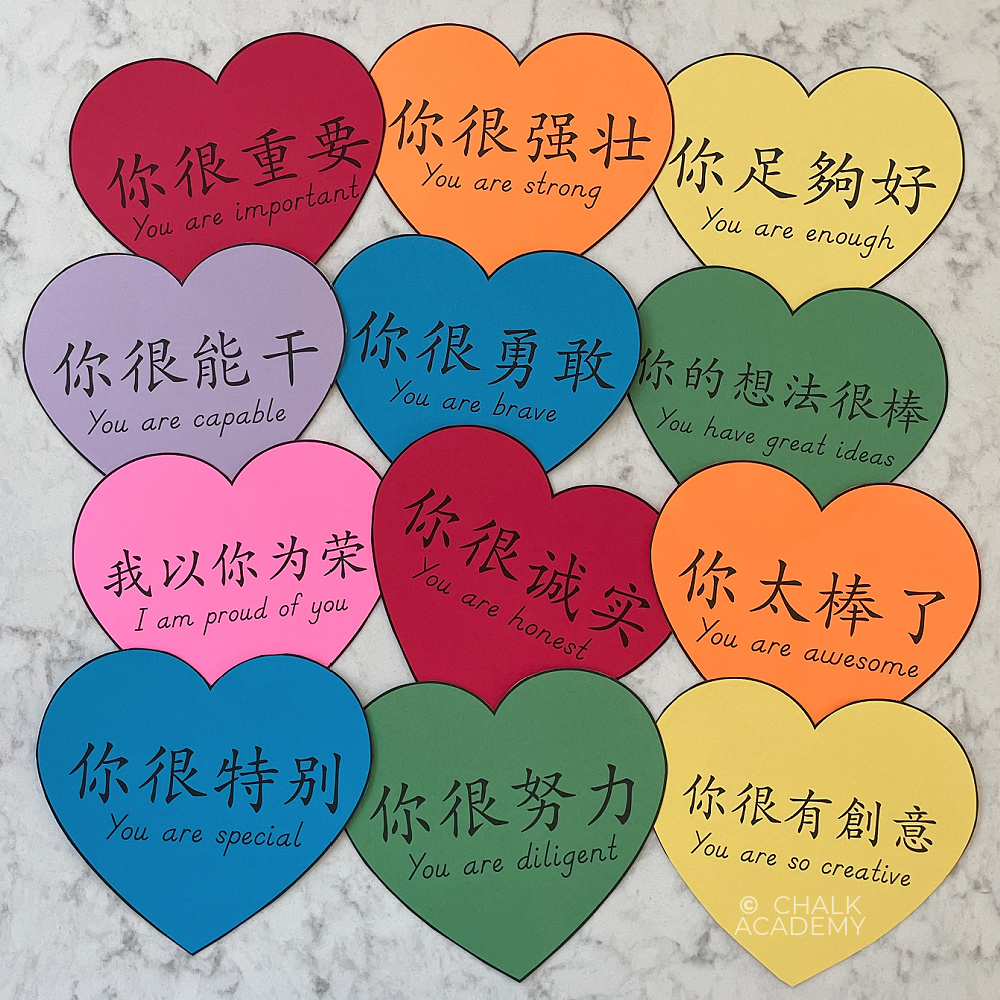


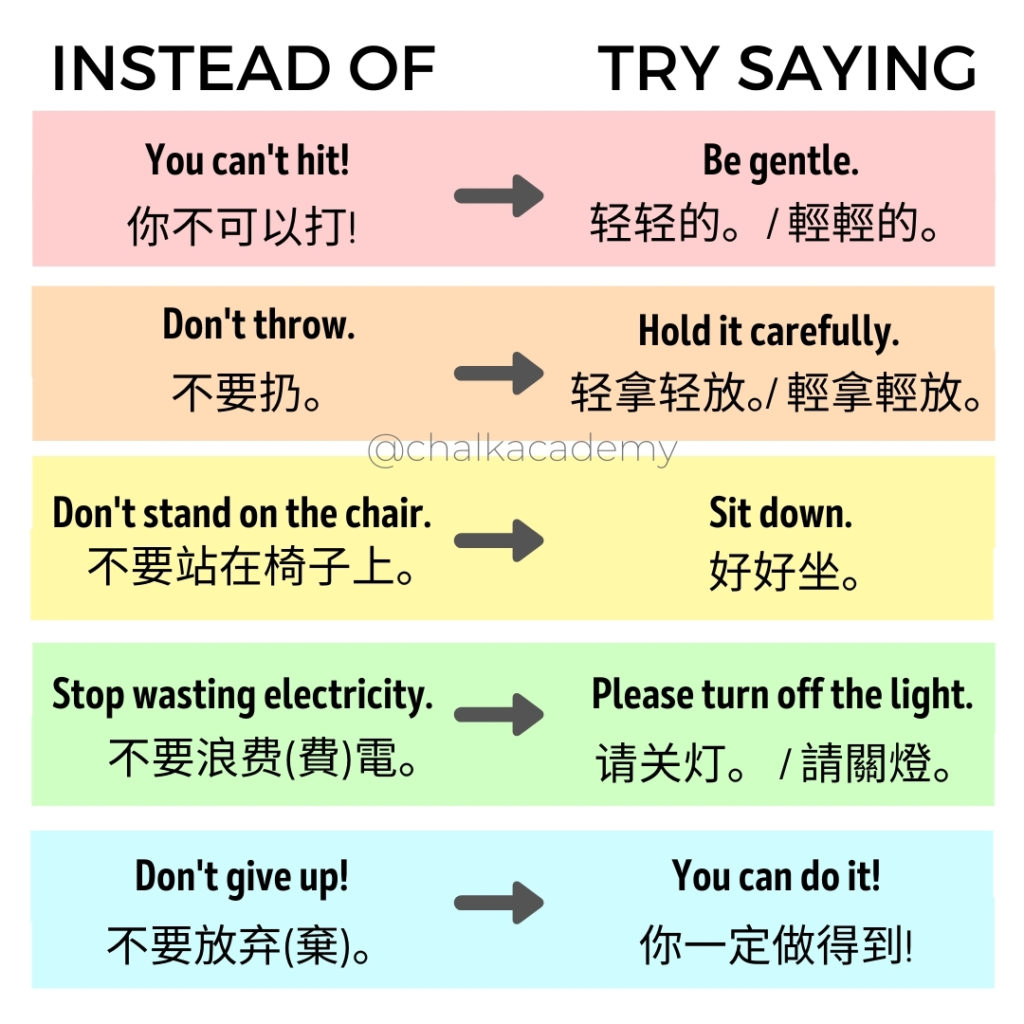
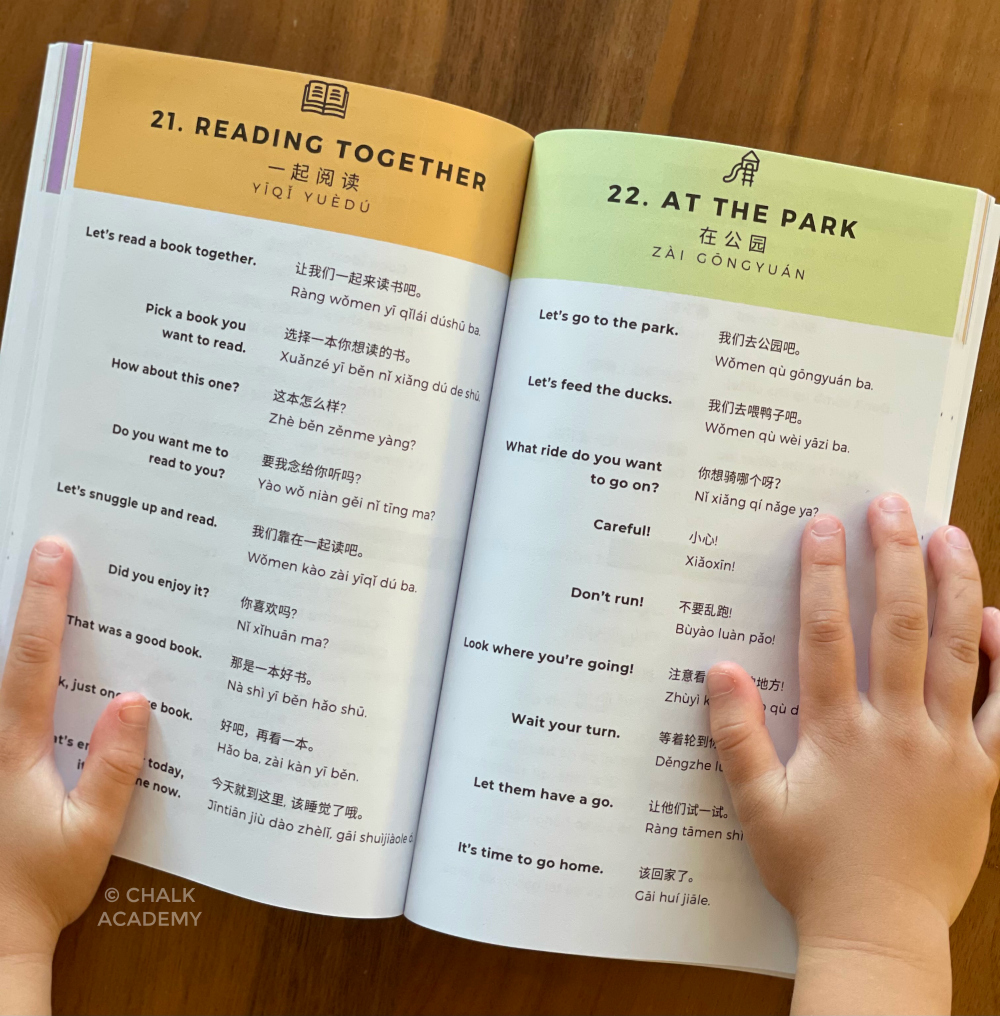
Wow this is helpful to share with my mom to explain to her in Chinese more than I could! It’s helpful for me as well but I really needed an explanation in Chinese. Thank you for this.